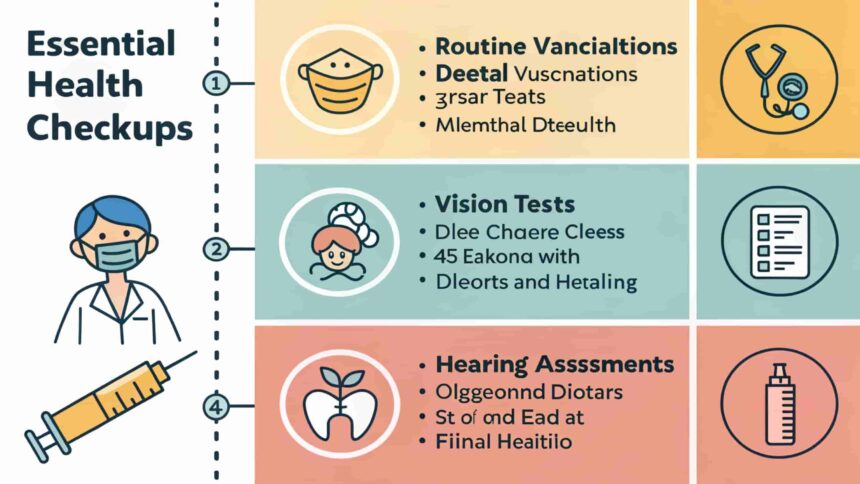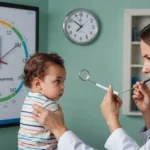Introduction
Regular health checkups are vital for children’s growth, development, and overall well-being. These visits not only catch early signs of illness but also help monitor physical, mental, and emotional progress. Pediatricians use routine checkups to guide parents and prevent future health issues through timely advice and vaccinations.
Newborn and Infant Checkups
The first year of life involves rapid development, so frequent checkups are needed. These typically occur:
- At birth
- 3–5 days old
- 1 month
- 2, 4, 6, 9, and 12 months
These visits include:
- Growth measurements (weight, length, head circumference)
- Vaccination schedule
- Hearing and vision screening
- Monitoring feeding, sleeping, and motor milestones
Developmental Milestone Screening
At every visit, doctors assess developmental milestones in:
- Speech and language
- Social interaction
- Motor skills
- Cognitive abilities
Delays in milestones may indicate conditions like autism, hearing loss, or neurological issues. Early intervention significantly improves outcomes.
Vision and Eye Exams
Pediatric eye exams ensure children can see clearly and comfortably.
- First screening: At birth
- Regular checks: At 6 months, 3 years, and yearly from age 5
- Look for signs like squinting, frequent rubbing, or sitting too close to screens
Eye problems like amblyopia (lazy eye) or strabismus (crossed eyes) should be treated early.
Hearing Screenings
Newborns undergo hearing tests in the hospital. Ongoing screening is recommended:
- At 6 months and 1 year
- Before starting school
- If speech or learning delays are noticed
Hearing issues can lead to language delays and academic struggles if left undetected.
Growth and Nutrition Evaluation
Tracking weight, height, and BMI helps detect:
- Malnutrition
- Obesity
- Hormonal growth issues
Doctors also discuss feeding habits, vitamin intake, and hydration to guide healthy eating patterns.
Immunization Schedule
Vaccinations protect children from severe infectious diseases. Important vaccines include:
- DTP (Diphtheria, Tetanus, Pertussis)
- MMR (Measles, Mumps, Rubella)
- Polio
- Hepatitis A & B
- HPV (at adolescence)
- COVID-19 (as recommended)
Pediatricians follow national immunization schedules to ensure timely protection.
Dental Checkups
Dental health affects speech, nutrition, and self-esteem.
- First dental visit: By age 1
- Every 6 months after that
Pediatric dentists check for cavities, jaw development, and brushing habits.
Anemia and Lead Screening
Blood tests between 9–12 months (and again at 2 years) screen for:
- Iron-deficiency anemia
- Lead exposure
Early detection of iron or lead levels prevents long-term brain and behavioral issues.
Mental and Emotional Health Assessments
As children grow, emotional development becomes a focus. Pediatricians evaluate:
- Mood and behavior
- Anxiety and attention issues
- Social development
This is especially important during school-age and adolescence when peer influence and stress increase.
Behavioral and Learning Screenings
Children may face behavioral issues or learning disorders like ADHD or dyslexia. Checkups include:
- Parent questionnaires
- Observation of focus and interaction
- Referral to specialists if needed
Early assessment leads to better support at home and school.
Adolescent Health Exams
From ages 11 to 18, children face hormonal, emotional, and social changes. These visits include:
- Puberty and growth check
- Sexual health counseling
- Mental wellness screening
- Vaccines like HPV and meningitis
- Nutrition and exercise guidance
Pediatricians also address topics privately to encourage honest discussions.
Skin and Allergy Assessments
Common childhood conditions like eczema, hives, or food allergies are monitored. These exams help:
- Identify triggers
- Recommend treatments
- Prevent severe allergic reactions
Skin health also includes protection from sunburn and hygiene education.
Conclusion
Children’s health checkups are more than just routine—they’re crucial for catching problems early and guiding lifelong wellness habits. From infancy to adolescence, each stage requires specific attention. Regular visits with a trusted pediatrician ensure children grow strong, healthy, and happy.
FAQs
How often should children have routine checkups?
Infants: Monthly in the first year. Toddlers: Every 3–6 months. School-age: Yearly unless otherwise advised.
Are vaccinations safe for children?
Yes, vaccines are thoroughly tested and monitored. They protect against serious diseases and are recommended by global health organizations.
What should I bring to a pediatric checkup?
Bring vaccination records, notes on your child’s behavior or symptoms, and questions for the doctor.
When should my child first see a dentist?
By age 1 or within six months of the first tooth appearing.
Do school-age children still need checkups if they seem healthy?
Yes, annual checkups monitor growth, mental health, vision, and readiness for school activities.










